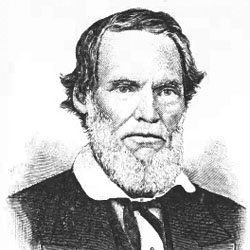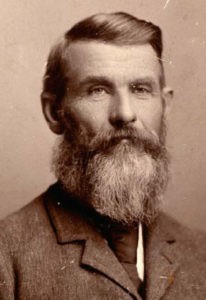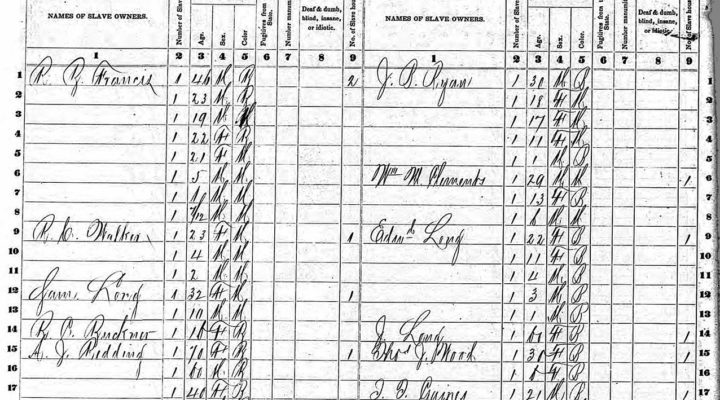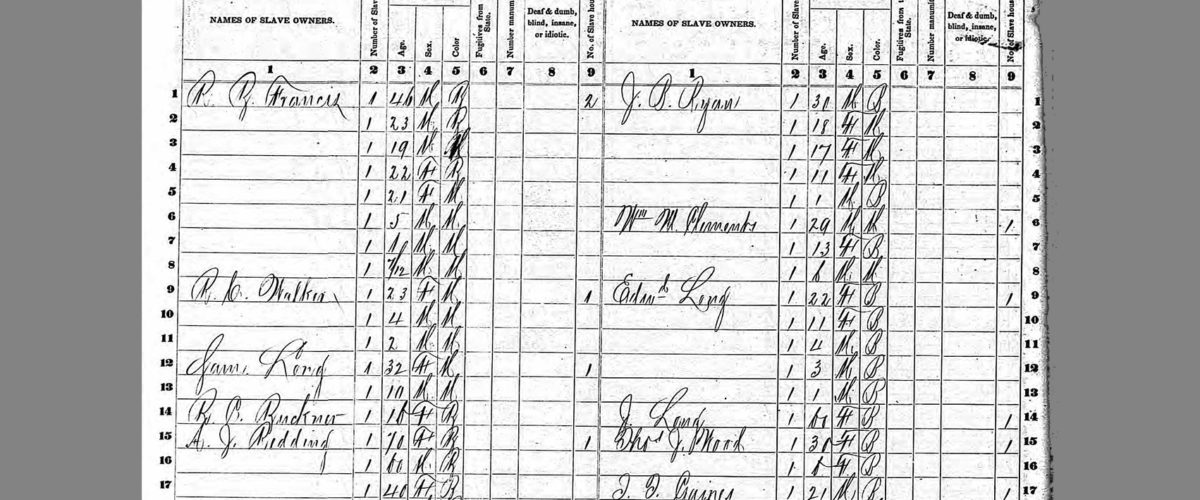A special commission at Baylor University recently reported on its historical research about the university’s founders and their connection with slavery and the Confederacy. This follows on the heels of a discovery reported in September 2020 that R.C. Buckner, for whom the child- and elder-care ministry Buckner International was named, also owned a slave when he was pastor of First Baptist Church of Paris, Texas.
I note these recent revelations with deep sadness because I believe my faith roots never have dealt fully with their enmeshment and symbiotic relationship to slavery. My conclusion crystallized after a mandatory reading of an article on “human trafficking” for the renewal of my Licensed Professional Counselor status.
Sadly, I have struggled with the growing realization that Southern Baptist Convention churches have not yet participated in a significant reckoning related to slavery and race.

R.E.B. Baylor
I offer some evidence, the most recent being the independent investigation of the Baylor founders, including Judge R.E.B. Baylor.
Let me start from the beginning as I understand it. Frankly, it took more than growing up in an SBC church, or earning an undergraduate degree from a Baptist college or a master’s degree from a Southern Baptist seminary to get at the real truth about both the South and Southern colonies before statehood and the Constitution.
The American South had both slavery and Baptist churches. As time passed, the U.S. Constitution was adopted and states entered the new Union, with slave states retaining their rights to own slaves. Churches of the South — of which many were Baptist — in word and deed supported the Southern states’ dependency on the slave trade and the use of slaves to the point that even pastors would own slaves.
In 1845, Baptists in the South split from Baptists in the North over the issue of slavery, and the Southern Baptist Convention was born. While historical revisionists attempt to diffuse the reasons for the split — just as they do the reasons for the Civil War — the reality is that the core unresolvable and intractable issue was slavery.
As SBC churches continued to grow throughout the South, they came to espouse the theological underpinnings of slavery and became complicit in the institution of slavery itself.

R.C. Buckner
Fast forward to today. Texas Baptist have been discovering that some of the “leading lights” of work in our state owned slaves. Buckner and now Baylor have identified founders as slave holders and have taken steps to address this history. I am reasonably sure there were more who have not yet been identified.
This should not be surprising. What is surprising is we are surprised at all. The SBC and its churches in the South were a part of the region’s slave culture. Of this there is no doubt.
However, there is sadly more if that were not enough. After the Civil War, in the South Jim Crow laws emerged as common attempts to suppress and oppress former slaves. Even in my seminary days (1972 to 1975) we were taught not to be surprised if one or more of our deacons were in the Ku Klux Klan. Sadly again, SBC churches facilitated the racial segregation that existed until the middle 1970s, even though President Lyndon Johnson signed civil rights legislation into law in 1964.
The 2016 presidential election and the 2020 presidential election also sadly reminded us that evangelical religious leaders and evangelical white males (up to 90%) still supported blatant racism in the candidacy of Donald Trump. Those white males were and are often members of Southern Baptist churches.
Again, we should not be surprised. Our whole denominational history is mired in human trafficking, which is the current phrase for what was done from the beginning of our nation. Our denomination has both supported slavery until it was outlawed after the Civil War and now continues to oppress and suppress African Americans in the South and beyond. In fact, throughout the nation, state legislatures — predominantly in states where Southern Baptists predominate — are currently attempting to adopt more restrictive voting measures for the sole purpose of making it harder for persons of color to vote.
“Our whole denominational history is mired in human trafficking.”
At the same time, some Southern Baptists genuinely want to face up, own up and move on from such a history of human trafficking, oppression and suppression. How do we do that?
How can we move forward when our heritage has cost so many lives of women, children and men dying on slave ships on their way to America? How can we move forward when so many African American lives have been lost, separated from family, and killed with no more thought than one would give to an animal?
First, we need to research and understand our history, the history of those who have come before us in family and faith, church and institution. And we who are white — especially white males — should yield to the leadership of those who are not white when possible. We can’t be both diagnostician and treatment director. We need warm-hearted people of color to help Baptists come to terms with our real legacy in order to move forward.
Reconciliation is about the deep work of the soul, which comes from being searched and sifted by the Holy Spirit, who alone highlights every sin, every thought, every intention that first dishonors Christ and sins against those for whom Christ died. We should concentrate on Psalm 139:23-24 — “Search me, O God, and know my heart; try me and know my anxious thoughts and see if there be any hurtful way in me, and lead me in the everlasting way.”
“Reconciliation is about the deep work of the soul.”
We also should meditate on 2 Corinthians 7:10 — “Godly sorrow brings repentance that leads to salvation and leaves no regret, but worldly sorrow brings death.”
Godly sorrow may be the essence of reconciliation between brothers of the same heavenly Father, for Scripture tells us it leads to repentance, which has a future of full salvation. Godly sorrow should lead us no longer to minimize the sins of the past. “Human trafficking” and “slavery” mean the same thing. Both grieve the heart of God and should grieve our hearts as well.
Second, we need to admit that the United States still struggles with race and racism. Christian brothers and sisters ought to be able to come together to advance the safety and value of all people. White evangelical Christian leaders should use their influence to stop the suppression and oppression of the poor — no matter what their skin color. I believe if influential white evangelical pastors would weigh in on the statehouse fights over “election integrity,” those attempts to suppress minority voting rights would be stopped in their tracks.
Finally, it is time to end racial discrimination in America once and for all. Don’t you think God is weary with his children always making distinctions where God has made none? Christ has died for all so that all may come to Christ. It is as simple as that.
The great takeaway from my years running the mental health department in a Texas maximum security prison that housed death row was simply the mantra, “Each is a person for whom Christ died.” I believe it is time for Southern Baptists and all God’s children to step into and onto the reality of that powerful truth.
Michael Chancellor served 33 years as pastor of four Baptist churches in Texas, seven years as a mental health manager in a maximum-security Texas prison and now is a therapist in private practice in Round Rock, Texas.


